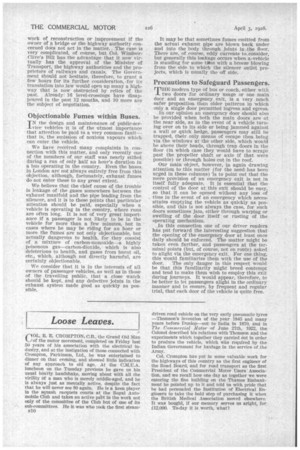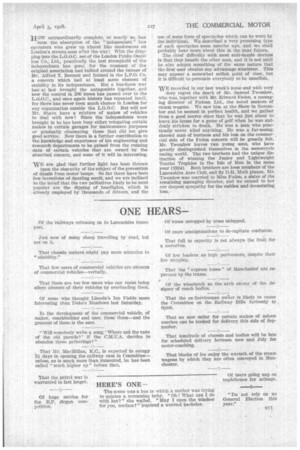Loose Leaves.
Page 44

Page 45

If you've noticed an error in this article please click here to report it so we can fix it.
el0L. R. E. CROMPTON, C.B., the Grand Old Man k_lof the motor movement, completed on Friday last 50 years of his association with the electrical industry, and at the instigation of those connected with Crompton, Parkinson, Ltd., he was entertained to dinner on that evening, and showed little indication of any approach to old age. At the C.M.U.A. luncheon on the Tuesday previous he gave us his usual hearty handshake, moving about with all the virility of a man who is merely middle-aged, and he is always just as mentally active, despite the fact that he will never see 80 again. He is a keen player in the squash racquets courts at the Royal Automobile Club and takes an active pa'rt in the work not only of the committee of the Club but of one of its sub-committees. He it was who took the first steam
B10 driven road vehicle on the very early pneumatic tyres —Thomson's invention of the year 1845 and many years before Dunlop—out to India in 1870, and in The Commercial Motor of Tune 27th, 1922, the Colonel described his relations with Thomson and the experiments which together they carried Out in order to produce the vehicle, which was required by the Indian Government for haulage in the service of the Army.
Col. Crompton has put in some valuable work for the highways of this country as the first engineer of the Road Board, and for road transport as the first President of the Commercial Motor Users Association, and we recall how one day as together we were entering the fine building on the Thames Embankment he pointed up to it and told us with pride that he had persuaded the Institution of Electrical Engineers to take the bold step of purchasing it when the British Medical Association moved elsewhere. It was bought, if our memory serves us aright, for 112,0190. To-day it is worth, what? HOW extraordinarily complete, or nearly so, has
been the absorption, of. the " independent" bus operators who grew up almost like mushrooms on London's streets, soon after the war ! With the dropping into the L.G.O.C. net.of the London Public Omnibus Co., Ltd., practically the last stronghold of the independents has gone; for the remnant of the original association had rallied around the banner of Mr. Alfred T. Bennett and formed in the L.P.O. Co. a concern which had at least some element of stability in its independence. But a bus-fares war has at last brought the antagonists together, and now the control in 200 buses has passed over to the L.G.O.C., and once again history has repeated itself, for there has never been much chance in London for any organization outside the L.G.O.C. But will not Mr. Shave have a mixture of makes of vehicles to deal with now! Since the independents were brought in he has been busy either relegating certain makes to certain garages for maintenance purposes or gradually eliminating those that did not give good service. Now there is a further contribution to the knowledge and experience of his engineering and re.settrch departments to begained from the running data of certain vehicles that are owned by the absorbed concern, and some of it will be interesting.
WE are glad that further light has been thrown upon the obscurity of the subject of the prevention of dazzle from motor lamps. So far there have been few inventions of dazzling merit, and we are inclined to the beilef that the two palliatives likely to he most popular are the dipping of headlights, which is already employed by thousands of drivers, and the use of some form of spectacles which can be worn by the..individual. We. described a very promising type of such spectacles some . months age, and we shall probably hear more about this in the near future.
The chief difficulty with most anti-dazzle deviees Is that they benefit the other man, and it is not until he also adopts something of the same nature that the first user obtains any advantage whatever. This may appear a somewhat selfish point of view, but it is difficult to persuade everybody to be unselfish.
1VE recorded in our last week's issue and with very
deep regret the death of Mr. Samuel Twemlow, who was, together with Mr. Edward Foden, a managing director of Fodens, Ltd., the noted makers of steam wagons. We saw him at the Show in November and he seemed in perfect health, and we gather from a good source since that he was just about to leave his house for a game of golf when he was suddenly stricken to death. He was a man who practically never ailed anything. He was a far-seeing, shrewd man of business and his loss on the commercial side of the Foden concern will be greatly felt. Mr. Twemlow leaves two young sons, who have greatly distinguished themselves in the motorcycle racing world. The two brothers had the unique distinction of winning the Junior and Lightweight Tourist Trophies in the Isle of Man in the same year (1924). Both brothers are keen members of the Lancashire Aero Club, and fly D.H. Moth planes. Mr. Twemlow was married to Miss Foden, a sister of the remaining managing director, and we extend to her our deepest sympathy for the sudden and devastating. loss.




















































































































